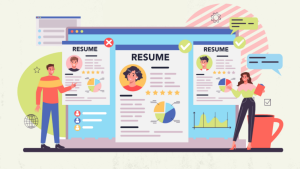Hard Skills vs Soft Skills: What to Highlight in Your Cover Letter?
 Publié le 17 April 2024
Publié le 17 April 2024
Hard skills vs soft skills, do you know what to highlight in your cover letter?
Cover letters are all about presenting yourself to a prospective employer in the best possible way, so they’re immediately keen to start working with you. But that’s much easier said than done.
In particular, a spot where plenty of people trip up is in the distinction between hard skills and soft skills and how to highlight them on their cover letter.
We’ll be covering that topic at length below so you know exactly how to help your cover letter shine. Read on to learn about hard skills, soft skills, and all the ways to use both of them to your advantage in the job hunt.
What Are Hard Skills?
You can think of hard or technical skills as tangible items you know how to do. They are teachable and learnable abilities.
Examples of technical skills include the ability to code in particular languages, in-depth knowledge of how to use specific tools, and being able to drive a car. Essentially, an employer should be able to ask you to prove your skill if you want to list it as a hard skill. This is why skill assessments are very common in certain industries, such as the tech sector.
So, if you want to tell your potential new employers that you’re an absolute pro at using a certain kind of workflow management software, that would count as a hard skill.
Free to use image sourced from Pexels
What Are Soft Skills?
These are the ‘non-tangible’ counterpart to hard skills. Soft or interpersonal skills are often closer to personality traits or abilities you have that are not specific to any particular tool or practice.
Examples of soft skills include teamwork, open-mindedness, people skills, and an aptitude for conflict resolution. They’re skills because you still have to train them, but they’re soft because you can’t necessarily give concrete, tangible proof of the fact that you’re a people-person.
Some people consider soft skills to be along the lines of entry-level skills, though they’re useful far outside of entry-level jobs, as we’ll explore shortly.
Hard Skills Versus Soft Skills: Points of Comparison
Next, we’ll consider how hard skills versus soft skills stack up against each other. As a disclaimer, we’re certainly not trying to say that one is better than the other–rather, we’d like to show you what makes them similar and different, and how to know which to highlight on your cover letter.
Soft Skills Are More Transferable
You can apply your soft skills to all kinds of jobs. If you were working as an IT consultant and you’d like to become a nurse instead, your soft skills will be instrumental in helping you make that leap, as coding expertise will likely not appeal to those hiring for nursing roles..
This is because soft skills influence the ways in which you interact with others and perform any job, not just jobs you’ve done before.
According to a recent survey, soft skills such as creative thinking will be in high demand from employers across industries going forward.
Hard Skills Are Job-Specific
On the other hand, hard skills are a great metric for your ability to perform roles in a sector you’ve already worked in. To go back to our earlier example, an IT consultant would likely have a portfolio of measurable abilities that includes programming languages and proficiency with particular programs and tools.
While hard skills can be used to help you transfer to new jobs, they’re more suited to giving you new opportunities in a similar sector. Our IT consultant could get involved in software development with their hard skills, for example.
Both Are Essential
It’s difficult to advertise your capacity as an employee by ignoring either hard or soft skills. That’s why they’re both crucial for anyone looking to help their cover letter stand out.
In fact, your hard and soft skills should ideally interact with one another so you can show new employers how great both of them are.
Let’s say, for example, that you have extensive knowledge of payroll processes and can answer questions like ‘what is net pay’ in your sleep. This is a useful hard skill. Combine it with soft skills like effective communication and strong project management, and employers will see the makings of a manager in the payroll department who can explain things to newcomers.
Free to use image sourced from Pexels
They’re Acquired in Different Ways
Soft skills are typically picked up through your work experience–which is to say that you use and improve them on a daily basis. You can still attend seminars, but they’re typically more for improving skills you already have, such as boosting your time management skills.
Hard skills, on the other hand, lend themselves more so to training programs and dedicated classes. This is because you wouldn’t spontaneously learn how to operate complex machinery or develop new professional skills, so you need to be taught to acquire the skill.
When Do You Need Hard vs Soft Skills?
We’ve established that hard and soft skills are both crucial, but which ones should take center stage in your cover letter?
That depends on what kinds of jobs you’re applying for.
Soft Skills: Your First Job
If you’re fresh out of high school or university, you’ll likely not have extensive experience working in a professional capacity at all. This means you won’t have many hard skills to speak of. This can make writing a cover letter as a new graduate seem very challenging.
The solution? Focus on your soft skills.
If you can find employers that favor skills-based hiring, showing off your wonderful soft skills will help you secure your first job that much faster.
Hard Skills: Promotions and Steps Up
Since they let you show how much you know about your field, hard skills make a great focal point for any promotions you’d like to apply for. They’re also great for similar roles that are a step or two up from your current one.
In both cases, showing the people reading your cover letter how good you already are with the kinds of tools you’ll be using lets you stand out from other applicants. It also reminds your readers why you’re a great choice for this new role.
Free to use image sourced from Pexels
Soft Skills: Changing Careers
We touched on this earlier, but it bears repeating. If you’re looking for a career change, you’ll definitely want to draw attention to your soft skills.
For example, let’s say you want to become an accountant. You may not be able to recite an audit trail meaning off the top of your head, but that doesn’t mean you should be counted out. Instead, tell hiring managers about your great numeracy skills and analytical mind.
Hard Skills: Showcasing Your Expertise
If you’re writing a cover letter for a highly specialized role, you’ll need to prove exactly why you’re the best possible fit for the position. A great way to do this is to highlight your hard skills.
That way, you can go a step beyond telling hiring managers that you know how to answer questions like ‘what is payroll processing’ and move straight into showing them that you’re the perfect fit for the very niche role they’re hiring for.
Best Practices for What To Highlight
Lastly, we’ll share some tips that concern hard skills versus soft skills in your cover letter. These will help you get your letters just right every time, so you can easily cut down the time it takes to find your dream job.
Tailor Each Letter for Each Job
This isn’t exactly a new piece of advice, but it’s always relevant, so we’re going to bring it up.
No matter which recruitment strategies your preferred companies use, they all want to learn about who you are as a person. That means you can’t just copy and paste the same general statements into every cover letter. Doing so would be a big mistake that will harm your chances of being hired.
Accordingly, you’ve got to analyze each job posting closely to figure out which soft and hard skills the recruiters are looking for. Do they value communication skills or critical thinking more highly? Be sure to include explicit references to these in your cover letter so you can really show how well you’d fit into the role.
It’s also well worth noting that some companies value hard skills more, such as energy firms. This should be reflected in your cover letter.
Free to use image sourced from Pexels
Focus on Skills You’re Proud Of
At the end of the day, we’re all looking for jobs that help us live the lives we choose. Part of that includes finding a place where you feel like you belong and where you can bring out your full potential.
This is much easier to do when you lead with your best self.
In other words, it’s a good idea to start including the skill sets you take the most pride in, whether those are hard or soft. Did it take you a long time to learn how to repair a fridge or how to take initiative in your own work? Bring this up, and let recruiters share in your pride.
Find the Right Balance
Skills of both kinds are necessary to help your resume stand out. As a result, completely excluding one or the other is rarely the right path.
You’ll want to test the waters and start finding the right balance bit by bit. Some industries favor particular types of skills–but at the same time, there are always going to be companies and groups that go against the current.
That’s another reason why tailoring each letter is important: it helps you strike the right balance between hard and soft skills every time.
Final Thoughts
The question of whether to focus on hard skills versus soft skills doesn’t have a clear-cut answer, and that’s because every job is unique.
You could get twenty HR coordinators together to ask them whether they focus more on their hard or soft skills, and chances are, each one would have a different answer. The same goes for most other jobs and sectors.
The answer, then, is to find your own strengths and always play to those. And, of course, to really balance your skill sets so you can present yourself as a well-rounded individual that has both practical abilities and the capacity for creative thinking.







